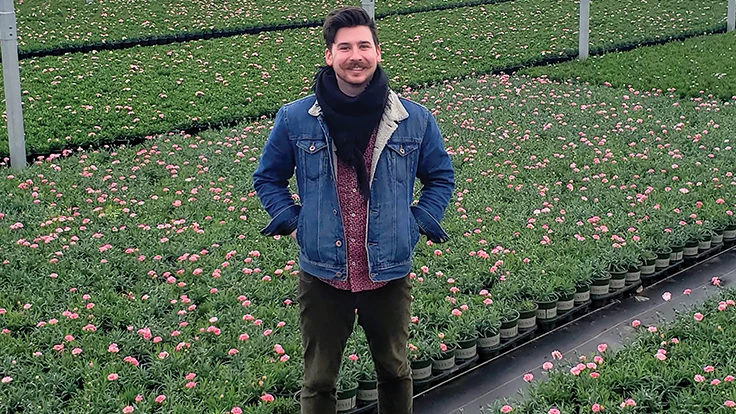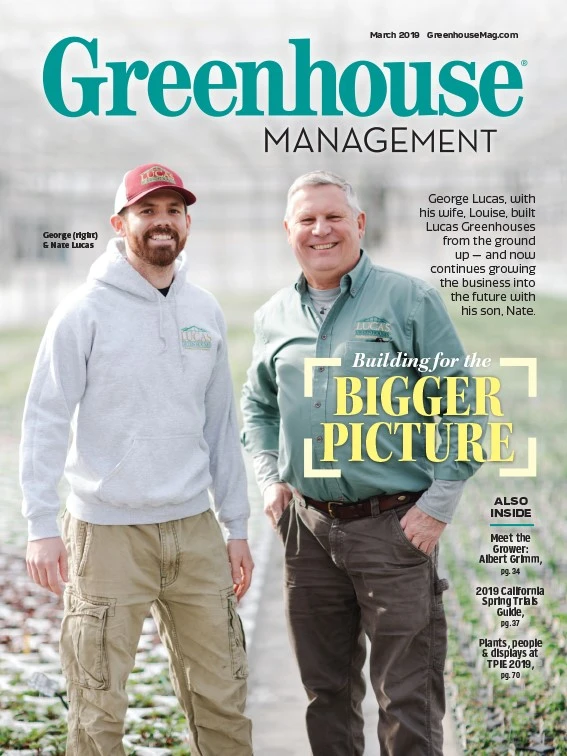

After graduating from The Ohio State University in 2016 with a degree in horticulture and a minor in agribusiness, Tanner Cole spent two-plus years working for Dümmen Orange in marketing. But in 2018, Cole left the breeder to work as the new general manager at Corso’s Perennials in Sandusky, Ohio. It’s a move that he says excites him because it gets him working directly with plants again.
Greenhouse Management: What about growing specifically made it something you wanted to come back to?
Tanner Cole: I’m a plant geek at heart — a total nerd when it comes to horticulture. When you work for a plant breeder, there is no shortage of administrative, logistical and business items to distract your focus away from the horticultural magic of plants and flowers. With Corso’s, it gives me the opportunity to get even more hands-on experience with the plants, get back in the greenhouse a bit more, and get back to my roots — pun intended.
GM: What do you feel like you can take from your time working at Dümmen Orange and apply to your work at Corso’s?
TC: Without a doubt, Dümmen [Orange] has some incredibly competent, intelligent and accomplished individuals on their payroll. In my time there, I was privy to the knowledge of those individuals and I definitely used that to my advantage. Dümmen Orange launched my career, there’s no denying that. Specifically, I think Dümmen [Orange] does a great job managing enormous projects like acquiring a broker, or building the most elite archive facility in the world, just to name a few examples. They take those projects and divide, delegate and shepherd them from vague concepts to concrete realities. [In] my two and a half years there, [I] saw significant involvement in similarly massive projects, and without that experience under my belt, I’d be hard-pressed to move along some of the large projects I’ve been working on at Corso’s as quickly as I have.
GM: Has the industry done a good job of enticing younger people to make horticulture a career?
TC: I don’t think the industry has done a particularly good job of enticing youthful people. I think it partially boils down to economics. If you go to a good educational institution — let’s say a land-grant university like Ohio State or others — and pay $15,000, $20,000 a year to graduate and make $25,000 starting out, there’s something with that math that doesn’t quite add up, right? I think collectively as employers, we haven’t done a good job of realizing the economic reality of our young-talent problem. Simultaneously, we are always talking about labor scarcity and cutting labor costs, so there is a balance to be found. But I also think some academic institutions have done a poor job of preparing horticulture students for the actual industry. In certain regards, when I graduated [from Ohio State], I was surprised at how much I didn’t know about the industry as whole. I knew a lot about plants. But I didn’t really understand the distribution chain, the importance of effective logistics or the impact of cannabis on the industry. As a young person myself, I’m trying to champion young people. I’m trying to draw people into Sandusky. There’s this stereotype that Millennials only want to live in cities and will never appreciate horticulture as much as generations before us — I don’t think that’s the case whatsoever. We just need to tout the benefits that our industry has to offer.

Explore the March 2019 Issue
Check out more from this issue and find your next story to read.
Latest from Greenhouse Management
- Anthura acquires Bromelia assets from Corn. Bak in Netherlands
- Top 10 stories for National Poinsettia Day
- Langendoen Mechanical hosts open house to showcase new greenhouse build
- Conor Foy joins EHR's national sales team
- Pantone announces its 2026 Color of the Year
- Syngenta granted federal registration for Trefinti nematicide/fungicide in ornamental market
- A legacy of influence
- HILA 2025 video highlights: John Gaydos of Proven Winners





